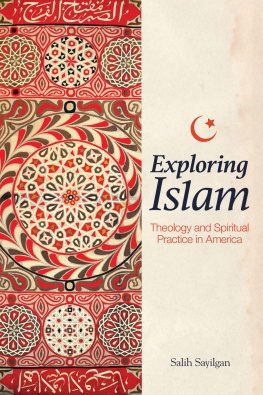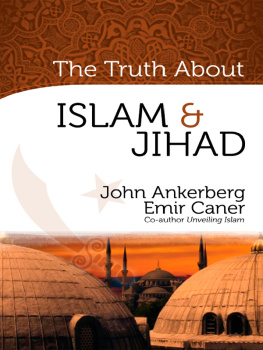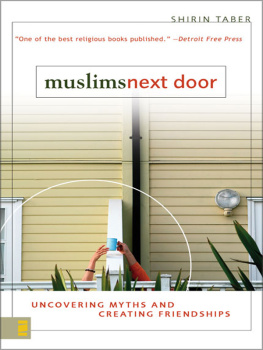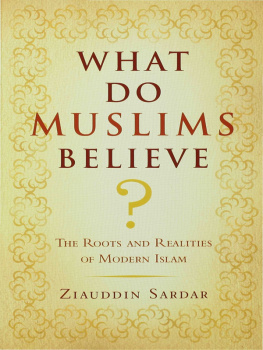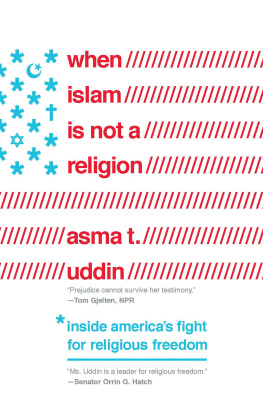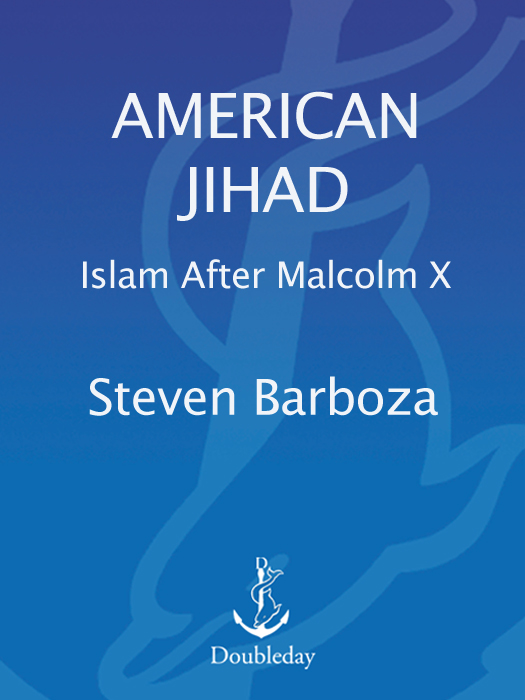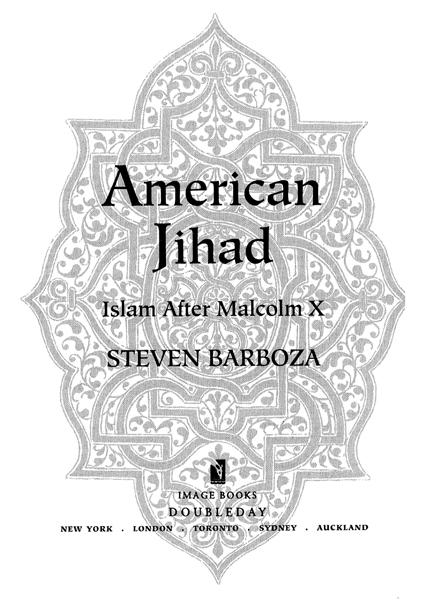A N I MAGE B OOK
PUBLISHED BY DOUBLEDAY
a division of Bantam Doubleday Dell Publishing Group, Inc.
1540 Broadway, New York, New York 10036
I MAGE , D OUBLEDAY , and the portrayal of a deer drinking from a stream are trademarks of Doubleday, a division of Bantam Doubleday Dell Publishing Group, Inc.
American Jihad was originally published in hardcover by Doubleday in 1994.
The Image Books edition published by special arrangement with Doubleday.
Grateful acknowledgment is made to the following for permission to reprint material:
Excerpt from The Autobiography of Malcolm X by Malcolm X, with the assistance of Alex Haley. Copyright 1964 by Alex Haley and Malcolm X, and copyright 1965 by Alex Haley and Betty Shabazz. Reprinted by permission of Random House, Inc.
Excerpt from The Meaning of the Holy Quran by Abdullah Yusuf Ali. Amana Corporation, Brentwood, Maryland, U.S.A.
Excerpts from For the Love of Allah, by Idris M. Diaz, the Philadelphia Inquirer Magazine, April 2, 1989.
Lyrics from Blessed Are Those Who Struggle and Get Moving by Suliaman El Hadi.
Excerpt from The Fire Next Time by James Baldwin, 1962, 1963, copyright renewed. Published by Vintage Books. Reprinted with permission from the James Baldwin Estate.
Lyrics from Lifes a Test by Maryum Ali.
The Library of Congress has cataloged the Doubleday edition as follows:
American jihad : Islam after Malcolm X / by
Steven Barboza.
p. cm.
1. Black MuslimsHistory. 2. IslamUnited StatesHistory20th
century. I. Barboza, Steven.
BP221.A46 1994
297.87097309045dc20 93-31469
eISBN: 978-0-307-77802-4
Copyright 1994 by Steven Barboza
All Rights Reserved
v3.1
To Regina Fe, Lillian, and Lillie
Contents
Acknowledgments
To thank those who contributed in some way to the completion of this book would take many pages and I would still unintentionally neglect to name everyone; the list goes on and on. But I would not feel that this book is complete without furnishing at least the short list:
Malaika Adero
Shamshoodeen Ali
Nawal Ammar
Jervis Anderson
Linda Anderson
The Barboza Family
Jean Barros
Sandra Batmangelich
M Booth & Associates
Karen Borack
Marie Brown
Michael Crawford
Cindy Gilmore
Yvonne Haddad
Carole Hall
Sohail Hashmi
Mary Anne Howland
Diane Joseph
The Walter Lewis Family
Leonard Muhammad
Sheila Musaji
Brad Rodney
Ruben Vargas
Mohamed Zakariya
I am especially grateful to my editor, who rescued, polished, and pushed the manuscript toward publication, initiating the whole process in a relatively brief telephone call.
And my wife, Regina: Her generous love, support, comfort, strength, encouragement, and warmth sustained me all along.
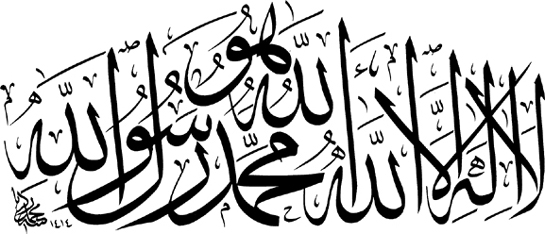
There is no God but God,
Muhammad is His Messenger,
God is He.
The shahada, the fundamental creed of Islam.
Introduction
Allahs Will in America
I discovered Malcolm X late.
He died in 1965, eight years before I heard his message. Yet for me his words were fresh and newand they could still strike fear into peoples hearts.
Many years before Hollywood got around to putting his life on film, and decades before his X adorned baseball caps, I would hole myself up in a library and listen to recordings of his speeches. They were full of pent-up rage. He lashed out at the white man, whom he called a blue-eyed devil and derided as a liar, a drunkard, an adulterer, a thief, a murderer. I marveled at his gall, at the convincing tone of his seditious voice, at the power and conviction with which he said the black mans natural religion was Islam. He said the American Negroes ancestors were, in fact, African Muslims and America wanted to hide this from the Negro because this country actually feared what the Negro could bring himself to do if he set his mind to it. Things could get out of hand.
I wanted to know more, so I visited the Nation of Islams Boston temple, where I attended a sort of Sunday-school class. There, a well-dressed minister inveighed hard against Christianity, calling it the religion of death and saying its symbol, the crucifix, provided clear enough proof of that. Just open your eyes and see how Jesus was nailed to the cross, and how Christians adore the whole idea, he said.
On the streets, I met bow-tied brothers hawking bean pies and Muhammad Speaks, the Nations newspaper. They eagerly preached one on one, and their dignified bearingit seemed drilled into themappealed to that part of me attracted to uniforms and regimentation. They were sharp, respectful, and streetwisenationalist soldiers molded into a fearless image, that of Malcolm.
Ironically I found them charming. They fired my imagination. They were prepared seemingly to lay down their lives for a sacred-held cause, and as the scholar C. Eric Lincoln pointed out, self-sacrifice was the lifeblood of this movement. And they were always more than willing to carry on for hours, expounding on what they considered to be the treacheries of the white race, rehashing the teachings of their honorable spiritual leader, Elijah Muhammad, so their listeners might wake up and come back to life, to their senses, by understanding a few simple truths.
Yet they also had the ominous, disciplined look of a firing squad. I sensed there was something secretive, exclusionary, even combative, about them. The slightest perceived offense might tick them off or might be interpreted as a breach of trust. I imagined setting them off in a tirade just by debating some finer point. With their short haircuts and leery, ever-watchful gaze, they seemed ready to fall into rankpoised to bring a karate chop down on my neck. To me they were desperate, indoctrinated men locked in a fierce struggle.
Their version of Islam lacked the spiritual breadth I typically associated with religion. Its focus was shamelessly narrow, politicized and essentially racist. Elijahs Lost-Found Nation in the West was quasi-religiousa cult that appeared to be losing ground since Malcolms assassination. It was no longer championed by that angry man whod lured thousands of blacks with his charisma and seductive logic. His death had left a void.
Elijah himself was regarded as messianic and he did inspire the devotion of a large following, but to much of the black community his appeal was basically that of a wizened old man, a venerated entrepreneur with a philosophy of self-help that sounded eminently sensible and levelheaded, that sounded in fact like just the sort of thing I figured black America needed to hear. And heed.
In his teaching he effectively played on blacks hatred for their conditions and their oppressor, using it as a unifying theme for his dogma and as the foundation upon which to build his community.
His instincts were superb. He worked the black community by crystallizing a clear vision of the enemy, appealing to blacks sense of belonging and by taking advantage of the black Americans proclivity for joining. As Lincoln pointed out in his book The Black Muslims in America, the Negro is compelled to join in order to escape the isolation, the sense of deprivation he experiences as a social outcast. One could very easily become a member of his nationwide community, a positive, spiritually uplifting, intensely pro-black organization.


